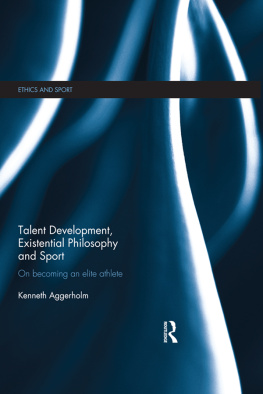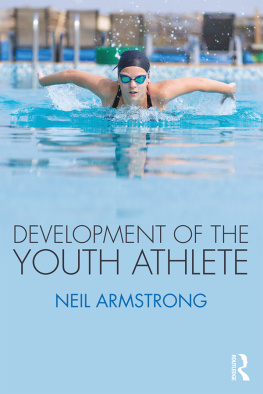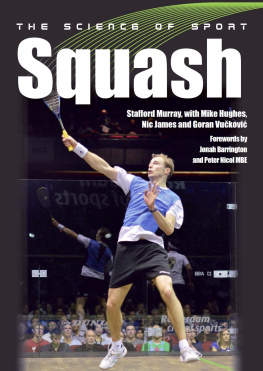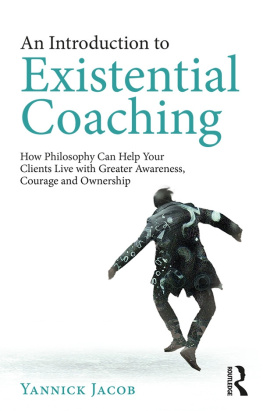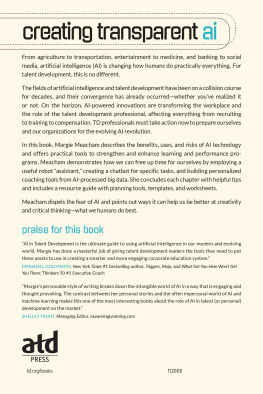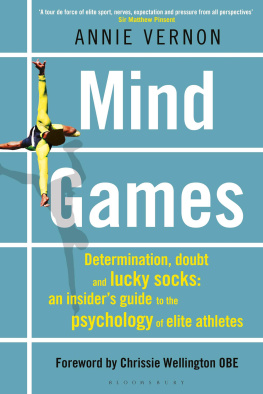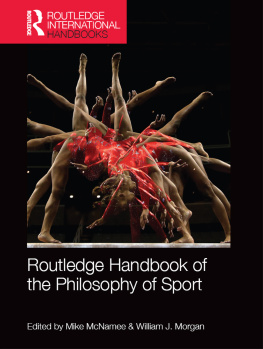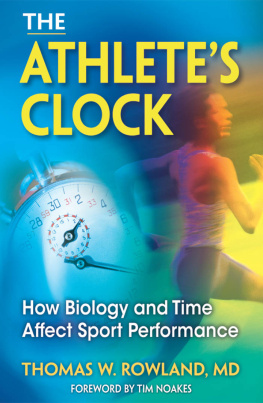Aggerholm - Talent development, existential philosophy and sport : on becoming an elite athlete
Here you can read online Aggerholm - Talent development, existential philosophy and sport : on becoming an elite athlete full text of the book (entire story) in english for free. Download pdf and epub, get meaning, cover and reviews about this ebook. year: 2015, publisher: Taylor and Francis;Routledge, genre: Romance novel. Description of the work, (preface) as well as reviews are available. Best literature library LitArk.com created for fans of good reading and offers a wide selection of genres:
Romance novel
Science fiction
Adventure
Detective
Science
History
Home and family
Prose
Art
Politics
Computer
Non-fiction
Religion
Business
Children
Humor
Choose a favorite category and find really read worthwhile books. Enjoy immersion in the world of imagination, feel the emotions of the characters or learn something new for yourself, make an fascinating discovery.
- Book:Talent development, existential philosophy and sport : on becoming an elite athlete
- Author:
- Publisher:Taylor and Francis;Routledge
- Genre:
- Year:2015
- Rating:4 / 5
- Favourites:Add to favourites
- Your mark:
- 80
- 1
- 2
- 3
- 4
- 5
Talent development, existential philosophy and sport : on becoming an elite athlete: summary, description and annotation
We offer to read an annotation, description, summary or preface (depends on what the author of the book "Talent development, existential philosophy and sport : on becoming an elite athlete" wrote himself). If you haven't found the necessary information about the book — write in the comments, we will try to find it.
Aggerholm: author's other books
Who wrote Talent development, existential philosophy and sport : on becoming an elite athlete? Find out the surname, the name of the author of the book and a list of all author's works by series.
Talent development, existential philosophy and sport : on becoming an elite athlete — read online for free the complete book (whole text) full work
Below is the text of the book, divided by pages. System saving the place of the last page read, allows you to conveniently read the book "Talent development, existential philosophy and sport : on becoming an elite athlete" online for free, without having to search again every time where you left off. Put a bookmark, and you can go to the page where you finished reading at any time.
Font size:
Interval:
Bookmark:
The phenomenal field of talent development
What does it mean to pursue an existential understanding of talent development in sport? As the title of the book suggests this is my aim, but the notion existential is not unequivocal. Therefore, in this chapter I will attempt to clarify the understanding of it that will guide the present pursuit. This will at the same time introduce the overall theoretical and methodological approach of the book, which is rooted in existential phenomenology . In the following I will describe what this implies and how this can contribute to a deeper understanding of the experience of being a young athlete developing in sport. The aim is not to provide an exhaustive account of the complex history and diverse approaches within existential and phenomenological philosophy. For the present purpose I am interested in how it can help in revealing and describing a phenomenal field of meaning in sport that is often overlooked. This field can also be described as the practical landscape of talent development and to navigate in this I will first illustrate how phenomenological method can be of assistance. Since the scope of this book is talent development in elite sport I will situate the methodological considerations in the context of modern sport and contemporary approaches to this in sports science, with the ambition of showing how a phenomenological attitude can allow seeing through the dominating rationality in this field. This will subsequently open for describing various aspects and structures of experience within this practical landscape. To prepare the analyses of this in the next chapters I will round off by outlining the general understanding of subjectivity in this book, which will lay the foundations for the subsequent attempts to better understand why young athletes strive to become elite athletes.
A first and important thing to notice about a phenomenological method is that it involves a kind of philosophical reflection that attempts to suspend or bracket our natural attitude. This natural attitude describes our ordinary and common sense conception of reality, which seems so obvious that it can be hard to see how things could be different. It is the attitude of ordinary science, which is so absorbed in its investigation of the natural (or social/cultural) world that it doesnt pause to reflect upon its own presuppositions and conditions of possibility (Gallagher and Zahavi 2008, 22). This is the approach to practice for most athletes, coaches, experts and researchers in sport. There is nothing wrong with that. It is only natural. But at the same time it does not reveal the whole story about this field of practice. In our natural attitude we tend to overlook or forget the foundation of lived experience from which our rational and conceptual understanding, as well as the world of science, gets its meaning. It is therefore the aim of the present investigation to contrast the natural attitude with a philosophical attitude that critically questions and interrogates the foundation and the precondition for both scientific thought and experience. This foundation is the phenomenal field, but before considering this primary layer of meaning it can be useful to first take a look at a prevalent kind of natural attitude to sport today that reveals the world through instrumental rationality . I will use this broad notion to highlight a dominating set of values that arose in modernity and found its way into the practice and study of modern sport. By illustrating some general tendencies in contemporary approaches to sport that appear to reflect a worldview guided by instrumental rationality it is my ambition to present a contrasting perspective against which the existential approaches of the present book can be better understood.
It is well known to most sport scholars how Guttmann (2000) in his analysis of modern sport pointed to how the logics of modern sport are dominated by a particular means-end rationality that resembles Webers (1978) analysis of instrumental rationality. From this, Guttmann described how the beginning of our modern obsession with quantification and the passion for precise measurements and statistical permutations in sports are related to the scientific revolution in the seventeenth century and the popularisation of mathematical discoveries during the eighteenth century. Guttmann therefore proposed that modern sport is intimately related to the instrumental attitude of modern science: The emergence of modern sports represents the slow development of an empirical, experimental, mathematical Weltanschauung (Guttmann 2000, 256). It is also well known how he narrowed the implications of this worldview down to seven distinguishing and interrelated characteristics of the social and historical phenomenon of modern sport: secularism, equality of opportunity, specialisation of roles, rationalisation, bureaucratic organisation, quantification and the quest for records (Guttmann 1978, 1555). Homo mensor reigns in this domain, as Guttmann noticed, and modern sports are characterized by the almost inevitable tendency to transform every athletic feat into one that can be quantified and measured (ibid., 47, his emphasis).
Within the philosophy of sport these instrumental aspects of modern sport have been widely discussed in relation to topics such as ethics, doping, performance enhancement, health, embodiment, fair play and many others. Especially Loland (2000; 2001; 2009) has been influential in his critique of these instrumental norms and values that dominate modern sports and form a social logic that aims for a linear quantifiable progress within this domain: Through the quest for standardisation and objectivity, scientific and technological know-how is applied to control the uncontrollable, to eliminate chance, and to measure performance improvement in an increasingly more accurate way (Loland 2000, 42). Whilst it is only natural to find this kind of rationality in the scientific study of sport within physiology and biomechanics, there can be reasons to be concerned when it spreads to other areas. As Hoberman (1988; 1992) has argued at length, this technological image of man that governs modern high-performance sport can degenerate into an unsustainable psycho-engineering of athletes as it enters the field of modern sport psychology, which he regards as the ultimate sport technology (Hoberman 1988, 206). He calls it a manipulative psychology and a form of psycho-doping because of its primary task, which is to get the last reserves out of you (ibid.). In this way the modelling of mental processes to shape and strengthen the (equip-)mentality of athletes conforms with the instrumental rationality and as Hoberman sums up his reflections on the matter:
sport science treats the human organism as though it were a machine, or as though it ought to be a machine. This technologized human organism comprises both mind and body, for which there are distinct sets of strategies. The implicit demand of these strategies, in my view, is a streamlined and decomplexified image of the human being.
(Ibid., 2067)
Today, over 20 years after he proposed this sombre diagnosis, it can be hard to find evidence that he was not right. Nesti (2004; 2007; 2011) has for example insistently pointed to how sports science and especially areas of sports psychology is still characterised by research methods derived from natural science. This makes it possible to consider both performance and development as a kind of hard science, seeking causal and measurable relations between intervention and effect. The result is that scientific approaches to elite sport within this field of research are to a still larger extent occupied with quantification, measurement, monitoring, objectification, statistical permutation, etc. With few exceptions this is also reflected in recent anthologies that present a range of the most common approaches to performance and development in contemporary sports science (Baker et al. 2012; McGarry et al. 2013; Williams 2013). Here the instrumental rationality can be found not just in the chapters concerning physiology and biomechanics, but also in other approaches that deal with the environmental factors, game analysis, skill-acquisition, game intelligence, mental skills, etc. Apart from the characteristics highlighted by Nesti above these reveal an orientation towards seeking mechanistic principles, objective variables, profiles and standards that can explain performance and development. The recent special issue of Talent Development and Excellence (Phillipson and Vialle 2013) on new directions in the study of talent and creativity, some of which concern development in sport, is another good example of how this rationality can lead to an eagerness for objectifying the process through systems and models. The issue contain no less than 18 models, all of which are well suited for empirical test of the specific variable they have found it relevant to focus on.
Font size:
Interval:
Bookmark:
Similar books «Talent development, existential philosophy and sport : on becoming an elite athlete»
Look at similar books to Talent development, existential philosophy and sport : on becoming an elite athlete. We have selected literature similar in name and meaning in the hope of providing readers with more options to find new, interesting, not yet read works.
Discussion, reviews of the book Talent development, existential philosophy and sport : on becoming an elite athlete and just readers' own opinions. Leave your comments, write what you think about the work, its meaning or the main characters. Specify what exactly you liked and what you didn't like, and why you think so.

